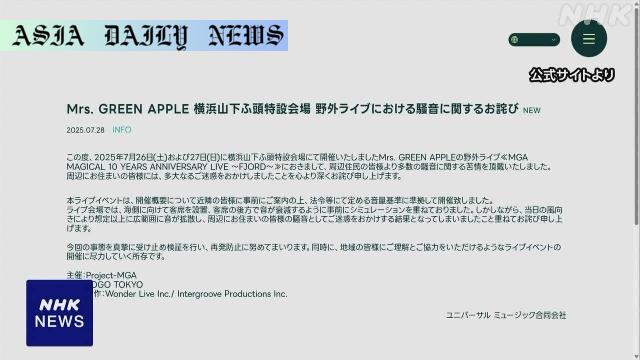Noise: A concert by Mrs. GREEN APPLE in Yokohama prompts complaints from residents due to unexpected sound levels.

The Event That Triggered Complaints
Last weekend, the famous Japanese band Mrs. GREEN APPLE hosted a grand outdoor concert at Yokohama Port, located near the bustling city of Tokyo. Over 100,000 fans flocked to the venue across the two-day event to witness their favorite musicians perform live. The concert, however, ended up generating a wave of dissatisfaction and irritation among the local residents who found the noise levels unbearable.
The concert’s organizers, Universal Music Japan, adhered to sound and safety regulations by carefully positioning loudspeakers in ways they believed would limit sound travel to the surrounding neighborhoods. The seating arrangements were specifically designed near the shoreline, while the orientation and volume of the audio systems were calibrated to minimize local disturbances. Unfortunately, unpredictable environmental factors, such as wind direction, caused the sound to carry farther than anticipated into the surrounding areas.
The Residents’ Frustrations
While concert-goers enjoyed lively music and entertainment, the unforeseen acoustic reach sparked numerous complaints from Yokohama’s neighboring residents. Many stated that the late-night noise disrupted their daily routines and peace of mind. In such a densely populated urban area, noise disturbances can have significant negative effects on local communities, including interruption of sleep or difficulty maintaining regular schedules.
Residents took to social media and other platforms to express discontent, describing the event as overwhelmingly noisy and intrusive. Though the management conducted sound simulations before the concert, wind patterns on the weekend rendered their efforts ineffective. This incident highlights the urgent need for enhanced planning and technology in large-scale entertainment events held near residential zones.
Universal Music Japan’s Response and Next Steps
In response to the public backlash, Universal Music Japan issued a formal apology, expressing their regret for disturbing the local community. They assured residents that the incident was taken seriously and pledged to better manage such events in the future. Their statement outlined plans to review existing processes, engage in more detailed environmental simulations, and maintain closer communication with residents to ensure their understanding and cooperation.
The company acknowledged that despite their best efforts, they fell short of fully addressing potential risks, such as changes in environmental factors. They emphasized their commitment to refining sound engineering techniques and exploring technologies to localize audio effects. By improving their operational standards, Universal Music Japan hopes to prevent similar incidents and maintain good relations with the surrounding communities.
Balancing Entertainment and Community Well-being
This incident underscores the importance of balancing the desire for large-scale events with the need to respect neighborhood boundaries and maintain harmony. Yokohama, being a hub for entertainment and culture, attracts numerous high-profile events. However, this influx also brings challenges in ensuring that these events do not interfere with the daily lives of residents.
Concert organizers, municipal authorities, and stakeholders must work collectively to create guidelines that prioritize community well-being. Measures such as stricter venue selection, enhanced sound containment systems, and regular community consultations could make a significant difference. Additionally, fostering an ongoing dialogue with residents could help identify potential problems before events take place, paving the way for solutions that address their concerns proactively.
Commentary
Noise Management in Urban Event Planning
The recent incident involving Mrs. GREEN APPLE’s Yokohama concert has ignited an important conversation about noise management and community relations during large-scale events. It brings to light the intricate balance needed between entertainment and the day-to-day comfort of local residents. Events like these are vital for cultural vibrancy, but they must be planned with a broader perspective that includes the well-being of surrounding neighborhoods.
Learning from Oversights
While Universal Music Japan’s preparation, including sound simulations, indicates a degree of diligence, the unexpected role of natural factors, such as wind patterns, highlights the limitations of current methods. This serves as a valuable learning moment for event organizers to invest in adaptive and innovative sound technologies that minimize unintended acoustic disruptions. Collaboration with acoustic engineers and urban planners could pave the way for more precise predictions and planning in similar scenarios.
The Path Forward
To avoid recurrence, it is essential for companies and local governments to engage in transparent communication with affected communities. Apologies, while necessary, should be followed by actions that demonstrate a commitment to improvement. Universal Music Japan’s promise to refine their processes is a positive step, but the feasibility of their measures will determine community trust. Moreover, partnerships with municipal bodies could lead to stricter regulations, setting an example for other event organizers.
Ultimately, the Yokohama concert serves as a reminder of the ripple effects that entertainment events have on their environment. By addressing these challenges and fostering collaboration between stakeholders, it is possible to achieve a harmonious coexistence that benefits both event attendees and local communities.


